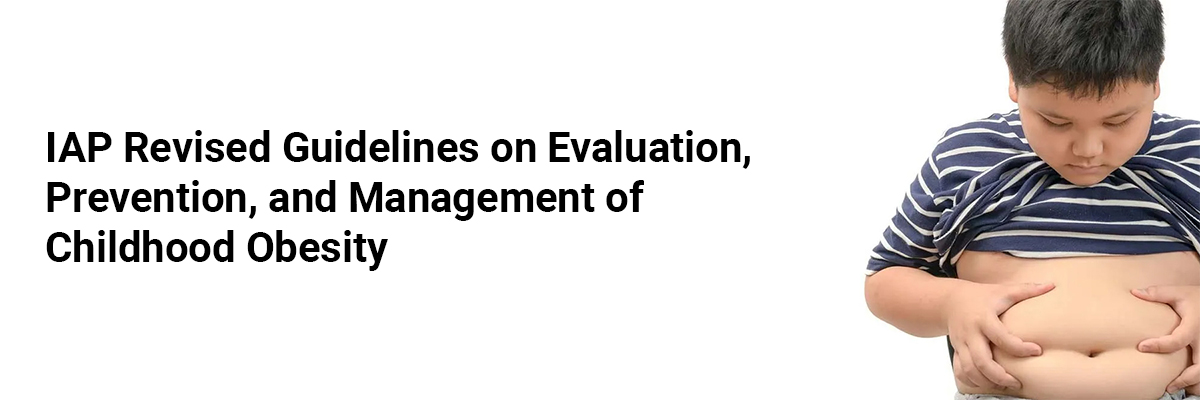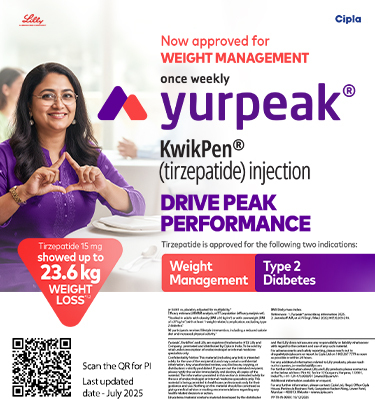
IAP Revised Guidelines on Evaluation, Prevention, and Management of Childhood Obesity
Fact Table: Key Statistics and Recommendations on Childhood Obesity
Aspect | Highlight / Recommendation |
| Prevalence | Obesity rates rising in both urban and rural India — a critical public health issue. |
| Definition | Chronic disease caused by excess/dysfunctional fat accumulation. |
| Diagnosis | Use IAP 2015 BMI charts (ages 5–18) with annual plotting; measure waist circumference for risk assessment. |
| Cause | Mostly lifestyle-related (primary/exogenous obesity). |
| Prevention | Healthy maternal weight, breastfeeding, balanced diet, and active lifestyle from an early age. |
| Physical Activity | Age-appropriate, culturally relevant daily exercise. |
| Screen Time | No screens under 2 years; strict age-based limits thereafter. |
| Advanced Care | Multidisciplinary approach if no improvement after 6 months; pharmacotherapy for adolescents ≥12 with class 2 obesity + comorbidities. Multidisciplinary approach if no improvement after 6 months; pharmacotherapy for adolescents ≥12 with class 2 obesity + comorbidities. |
| Surgery | Option for children ≥12 with severe obesity and comorbidities after failed lifestyle & medical therapy. |
Introduction
Childhood obesity is a growing health challenge in India and worldwide, recognized as a chronic condition due to excessive or dysfunctional fat accumulation that impacts both physical and psychological well-being. The Indian Academy of Pediatrics (IAP) has updated its guidelines for the evaluation, prevention, and management of childhood obesity, expanding upon foundational concepts with new insights into diagnosis, risks, and evidence-based treatments. This article integrates those updates into a comprehensive, authoritative resource aligned with Medtalks' style including childhood obesity prevention, pediatric obesity management, obesity guidelines for children, healthy lifestyle for kids, and obesity treatment in children.
The Urgent Need to Address Pediatric Obesity
Pediatric obesity is a multifaceted chronic disease requiring a concerted response from healthcare providers, policymakers, educators, caregivers, and communities. The prevalence is rising in urban and rural areas alike, necessitating early recognition, intervention, and sustained management efforts.
Comprehensive Evaluation and Diagnosis
Types of Childhood Obesity
Primary (Exogenous) Obesity: Caused mainly by lifestyle factors such as unhealthy diet and physical inactivity, this constitutes the majority of cases.
Secondary (Endogenous) Obesity: Resulting from medical, genetic, or endocrine disorders, requiring specialized evaluation.
Clinical Assessment Components
Body Mass Index (BMI): The primary diagnostic measure for children aged 5-18, plotted on IAP 2015 charts annually to track weight status.
Waist Circumference: A key measure for assessing abdominal fat and cardiometabolic risk, using Indian-specific percentiles.
Blood Pressure: Screening for hypertension, which is often associated with obesity.
Additional Evaluations: Endocrine or genetic testing is reserved for children with atypical presentations or early-onset obesity (<5 years).
Risk Factors Overview
Childhood obesity arises from a complex interplay of genetics, environmental influences, and psychological factors. Familial predisposition affects metabolism and appetite control. Urbanization, unhealthy dietary patterns, sedentary lifestyles, increased screen time, and socioeconomic challenges also play significant roles. Psychological contributors include stress-induced eating behaviors and comorbid mental health conditions like anxiety and depression.
Effective Childhood Obesity Prevention
Prevention is the cornerstone, starting from preconception and pregnancy—optimizing maternal weight and health, avoiding smoking, and managing gestational weight gain.
Early nutrition strategies such as exclusive breastfeeding and introduction of balanced complementary foods support healthy growth trajectories. Promoting a healthy lifestyle for kids includes:
Balanced diets emphasizing fruits, vegetables, whole grains, lean proteins, and low sugar/salt.
Encouraging regular physical activity tailored to age and preferences.
Limiting screen time with no exposure before age 2, restricted duration for toddlers and children, and balanced media use for adolescents aligned with developmental guidelines.
Management and Treatment of Pediatric Obesity
Lifestyle Modification as Foundation
Initial management involves culturally sensitive, family-centered lifestyle interventions focusing on nutrition education, increased physical activity, and behavior modification to reduce sedentary habits.
Weight maintenance during growth is often the primary goal before pursuing weight reduction.
Multidisciplinary Team Approach
If lifestyle changes are inadequate after six months, referral to a team comprising pediatricians, endocrinologists, dietitians, psychologists, and exercise specialists is recommended for comprehensive care.
Pharmacotherapy
Medications may be considered adjunctively in adolescents aged 12 years and older with class 2 obesity and significant comorbid conditions, alongside continued lifestyle efforts.
Bariatric Surgery
Surgical intervention is reserved for select adolescents (>12 years) with severe obesity and related health complications when all other treatments have failed.
Advances in Diagnostic Techniques and Clinical Implications
Beyond BMI, additional measures improve risk assessment:
Waist-to-Hip and Waist-to-Height Ratios offer nuanced insights into fat distribution.
Body Fat Percentage by bioelectrical impedance or DEXA provides deeper understanding of adiposity.
Imaging Modalities (MRI, ultrasound) assess visceral fat burden.
Childhood obesity's medical consequences span cardiovascular risks (hypertension, dyslipidemia), metabolic syndrome, type 2 diabetes, respiratory problems (sleep apnea, asthma), musculoskeletal strain, increased cancer risk, and psychological challenges including low self-esteem, depression, and anxiety.
Role of Healthcare Providers in Pediatric Obesity Management
Successful management demands collaboration across specialties:
Primary Care Providers detect, educate, and initiate care plans.
Endocrinologists manage hormonal/metabolic aspects.
Nutritionists/Dietitians develop sustainable eating plans.
Psychologists address behavior change, mental health, and eating disorders.
Pediatric Surgeons perform bariatric procedures when indicated.
FAQ: Childhood Obesity Prevention, Treatment, and Healthy Lifestyle
What factors cause childhood obesity?
Ans. It is caused by genetic predispositions, unhealthy diets, low physical activity, excessive screen time, psychological factors, and environmental influences.How is obesity diagnosed in children?
Ans. Primarily by BMI plotted on standard growth charts, supported by waist circumference and clinical evaluation for complications.What are the best ways to prevent childhood obesity?
Ans. Healthy maternal nutrition, exclusive breastfeeding, balanced complementary feeding, limiting sugary/salty foods, increasing physical activity, and restricting screen time.When should medication be used to treat pediatric obesity?
Ans. For adolescents aged 12+ with severe obesity and associated health issues after unsuccessful lifestyle interventions.How effective is a multidisciplinary approach in treating childhood obesity?
Ans. It addresses the medical, nutritional, psychological, and social dimensions, increasing success rates.What are recommended screen time limits for children?
Ans. No screen time before 2 years; limited and age-appropriate screen use thereafter, not exceeding 2 hours per day for young children.Can childhood obesity lead to adult health problems?
Ans. Yes, it raises the risk of diabetes, heart disease, respiratory disorders, orthopedic issues, cancers, and psychological disorders later in life.How can parents support their children’s healthy lifestyle?
Ans. By encouraging balanced diets, physical activity, limiting screen time, and reinforcing adherence to treatment plans.















Please login to comment on this article